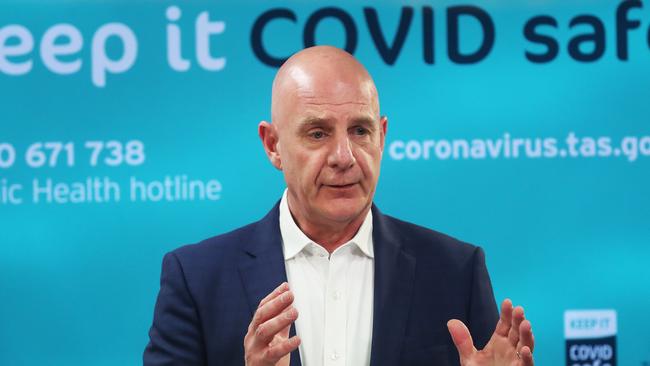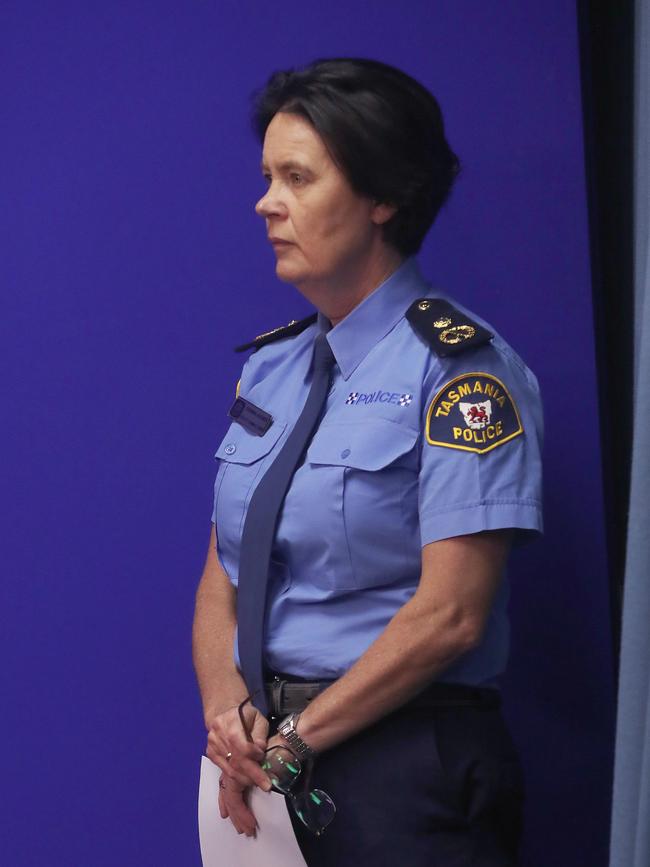TASSIE OPENS: Here’s what you need to know
Tasmania’s borders are open but there’s some important new Covid-19 rules locals and travellers should know. ALL YOUR QUESTIONS ANSWERED >>
Tasmania
Don't miss out on the headlines from Tasmania. Followed categories will be added to My News.
At the stroke of midnight, Tasmania reopened for business.
After months of changing border restrictions and Covid hot spots, the day has been a long awaited one for many, with travellers from across the country now able to roam Tasmania.
“Over the last 22 months, we’ve made some very difficult decisions,” Premier Peter Gutwein said.
“We’ve had to stop people entering to attend a funeral, bury a loved one, we’ve stopped weddings, we’ve stopped events.”
>> WATCH THE VIDEO: First Victoria and NSW arrivals touch down in Tassie

The border reopening comes as Tasmania’s double vaccination rates for those over the age of 12 nears 90 per cent, with 95 per cent having had their first dose and 89 per cent fully vaccinated.
The goal of 90 per cent for over 12s is within arm’s reach, according to the Premier.
“If everyone turns up in coming days as we’ve said, we will hit the second dose for over 12 by around the 17th,” he said.
“Importantly, keep turning up.”
REWATCH TUESDAY’S UPDATES
But the prospect of quarantine free travel comes with a strict set of rules.
All travellers entering Tasmania must complete a Tas e-Travel pass via the Tas E-Travel website.
Those from high risk areas will need to be tested 72 hours before travel.
Those travelling internationally will be required to quarantine for seven days in addition to those measures.
“All travellers will need to carry proof of vaccination with them or their negative test result with them whether that’s a digital vaccination certificate and or a Covid-19 test result by text message or hard copy evidence if they have it,” Mr Gutwein said.
For those who refuse to comply, there could be consequences.
Rule breakers risk an on the spot fine of $1557 or being summonsed with an offence to potentially cop up to six months in jail or a greater fine of up to $17,000.

Deputy state controller Donna Adams said those entering Tasmania could expect to see a high police presence.
“We think it’s important we’re there to educate the community on the requirements they need to comply with,” she said.
“But where there are travellers who make decisions to come into the state without complying with our rules, of entry, police officers will consider issuing infringement notices.
Non-compliant travellers could also be sent packing.
“If an unvaccinated traveller arrives at our border without our proper approval, the approach will be to turn the traveller back to the port they were at.”
Dep. comm. Adams believed Tasmania Police was well equipped to handle the extra demand.
“Tasmania Police have planned for the opening of the border for a number of months,” she said.
“We’re confident we’ve got the right plan in place for when people enter the state.”
The border reopening also means less than 300 people have been released from quarantine.
But as Tasmania welcomes travellers, there’s increased risk for the state, with cases of the omicron variant on the rise on the mainland.
To mitigate that risk, Tasmanians are urged to continue practising measures like social distancing and wearing masked, especially in crowds.
“If you can’t socially distance, wear a mask,” Mr Gutwein said.
“People will see me at large functions and events indoors where I’ll probably be wearing a mask.
“Don’t be surprised by that.”
How to get your booster shot
BOOKINGS are open for those wanting to get their five- month booster shot of the Covid vaccine, along with children aged between 5 and 11 to get their first dose.
The wait time to get a booster shot was reduced from six months to five months in response to the omicron variant.
Tasmanian Vaccination Emergency Operations Centre commander Dale Webster said thousands of appointments would be available over the coming week.
“Boosters are available in state clinics and at participating GP and pharmacy clinics,” Mr Webster said.
“Bookings are essential at vaccination clinics as we transition away from walk-ins from Wednesday to ensure Covic-19 safe management of crowds and waiting areas.”
Children’s vaccinations will be available at special clinics from January 10.
“The choice to vaccinate children in this cohort – while strongly recommended – is entirely voluntary and will not be mandated,” Mr Webster said.
“Children will get two doses, eight weeks apart – but they will only be available in special children’s clinics and GPs.”

He said the risk to children was lower.
“Although children are at lower risk of serious illness from Covid-19, we know children and young people experience some of the highest rates of infection and are one of the biggest social spreaders of the virus in households,” Mr Webster said.
“By getting vaccinated children will be less likely to pass the virus on to other more vulnerable members of your household.”
Extra vaccination clinics will be running this weekend in response to an increased demand for Covid-19 booster shots.
57,000 Tasmanians are now able to access the dose with around 108,000 Tasmanians eligible by the end of December.
Three extra clinics will open in Hobart, Launceston and Devonport to administer the Pfizer jab in a bid to vaccinate as many locals before Christmas.
- The Goods Shed, 41 Evans Street, Hobart - Sat 18 and Sun 19 December
- Door of Hope, 50 Glen Dhu Street, South Launceston – Sat 18 December
- The Don Centre, 100 Don Road, Devonport – Sat 18 December
Covid case management - your questions answered
I have visited a low-exposure site. What do I do?
If you have visited a low-risk exposure site, you must monitor yourself for symptoms. You must get tested if you develop symptoms, even if they are mild. You are not required to quarantine.
I’ve been told I am a casual contact. What does that mean and what do I need to do?
A casual contact is someone who has been in the same place as a confirmed case during their infectious period but does not meet the requirements for a close contact.
You must get tested between days 3 and 5.
You are not required to quarantine but you must wear a mask for 14 days from exposure to the COVID-19 case, when you can’t physically distance from others.
If you develop symptoms before or after the required test, you should isolate and have a test immediately.
The requirements for casual contacts are the same for vaccinated or unvaccinated people.
I am a close contact of someone who has tested positive. What do I need to do?
A close contact is someone who has had face-to-face contact with a confirmed Covid-19 case during their infectious period, creating a reasonable risk of transmission.
VACCINATED:
You must quarantine immediately and have a Covid-19 test. You must get tested again on day 5 or 6. If your test results are negative, you will be released from quarantine after seven days. You must also be tested again on day 12 or 13. If you develop symptoms between the required tests, you should isolate and have a test immediately.
For days 8-14, you must:
MAINTAIN physical distancing (1.5m) from other people;
WEAR mask where you can’t keep your distance;
AVOID non-essential activities;
NOT enter any high-risk settings, except for essential reasons;
AVOID contact with vulnerable people (eg elderly, pregnant, people with chronic health conditions).
UNVACCINATED:
You must quarantine immediately for 14 days from exposure to the COVID-19 case.
You must have a minimum of two COVID-19 tests. You will need to be tested immediately at the start of your quarantine, and again on day 12–13. If your test results are all negative, you will be released from quarantine after 14 days.
Someone I live with has tested positive.
Do I have to quarantine?
VACCINATED:
People who are vaccinated and in the same household as a close contact are not required to quarantine but should limit further exposure to the contact and avoid high-risk settings for 14 days. If you show symptoms, you should get tested.
UNVACCINATED:
People who are unvaccinated and in the same household as a close contact must also follow the quarantine requirements.
I am a business owner and a Covid-19 positive case visited my premises. Do I have to shut?
If Public Health notifies you that a confirmed Covid-19 case is linked to your workplace, they will work with you to identify what you need to do to protect other people and continue normal activities within your business as soon and as safely as possible.
The initial steps Public Health may ask you to take are to:
- Review and activate your COVID-19 Safety Plan and/or Outbreak Management Plan.
- Instruct people in your setting to wear face masks.
- Support Public Health contact tracing by collecting and providing any additional staffing and visitor information that has not been collected via the Check in TAS app. This may include staffing rosters, manual check in/visitor log sheets or spreadsheets.
- Advise any contacts you may identify to quarantine at home and follow the quarantine instructions.
- Liaise with Public Health to coordinate appropriate communications about the case or outbreak to other people who are associated with your workplace, such as staff, visitors, contractors and customers.
- Organise cleaning and disinfection of frequently touched areas, as outlined in your COVID-19 Safety Plan.
- Continue to encourage COVID-safe behaviours including physical distancing, hand hygiene, advising staff and visitors to stay at home if unwell, and covering coughs and sneezes.
- Importantly, if you have any questions, contact the public health hotline.
PUBLIC HEALTH HOTLINE: 1800 671 738




